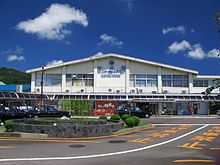Tosa Kuroshio Railway
The Tosa Kuroshio Railway (土佐くろしお鉄道, Tosa Kuroshio Tetsudō) is a third-sector railway company in Kōchi Prefecture, Japan. The name comes from the former Tosa Province and the Kuroshio Current. The company was founded in 1986, and operates three lines: a former Japanese National Railways (JNR) line (the Nakamura Line) and two planned JNR lines on which construction had commenced but then been suspended due to JNR construction funds being diverted to shinkansen projects in the 1980s (the Sukumo and Asa lines). After its formation, the company recommenced construction and subsequently opened the lines and now operates them.

Ownership
As of January 2013, shares in the company are owned by Kōchi Prefecture (49.1%), the city of Sukumo (8.3%), the city of Aki (7.3%), the city of Shimanto (6.4%), and Shikoku Bank (4.8%).[1]
Lines
Tosa Kuroshio Railway operates the following three lines.
- Nakamura Line (labeled "TK")
- Sukumo Line (labeled "TK")
- Asa Line (labeled "GN")
Station numbering
Each company station has a unique alpha-numeric label that complements the Shikoku Railway Company (JR Shikoku) system, designed to assist passengers unfamiliar with the lines, especially at transfer stations. For example, Gomen JR station's label is "D40", with "GN40" being the label of the Tosa Gomen Station.
Rolling stock
As of April 2014, the company owned a fleet of 23 diesel multiple unit cars as shown below.[2]
- 2000 series (1 x 4-car set, identical design to JR Shikoku 2000 series)
- TKT-8000 series single-car units (8 cars, built 1988 to 1999)
- 9640 series single-car units (11 cars, built 2002) ("9640" can be read as "Kuroshio" in Japanese)
History
The Tosa Kuroshio Railway was founded on 8 May 1986 for the purpose of resuming construction of the Sukumo and Asa lines, which had been planned by JNR but abandoned.[1] The company however first took over control of operations on the 43.0 km former JNR Nakamura Line (Kubokawa to Nakamura) from 1 April 1988, as its continued operation was a requisite for opening the Sukumo Line.[1] The company opened the 23.6 km Sukumo Line (Sukumo to Nakamura) on 1 October 1997, and the 42.7 km Asa Line (Gomen to Nahari) on 1 July 2002.[1]
See also
References
- Terada, Hirokazu (19 January 2013). データブック日本の私鉄: 全国私鉄165社局掲載 データブック日本の私鉄 [Databook: Japan's Private Railways] (in Japanese). Japan: Neko Publishing. p. 173. ISBN 978-4-7770-1336-4.
- Takai, Kunpei (30 June 2014). Morokawa, Hisashi; Hattori, Akihiro (eds.). 全国私鉄超決定版電車・機関車・気動車1700 全国私鉄超決定版 電車・機関車・気動車1700 [Nationwide Private Railway Ultimate Edition: 1700 EMUs, Locomotives, and DMUs] (in Japanese). Tokyo, Japan: Sekaibunka-sha. p. 263. ISBN 978-4-418-14219-4.
- Official website in English
- Official website in Japanese